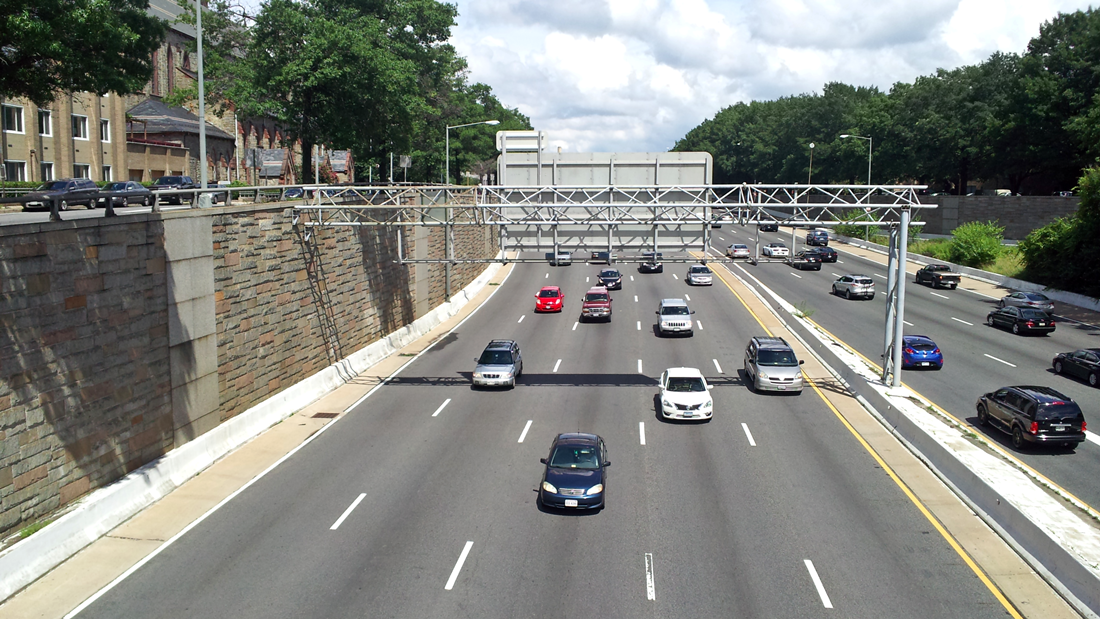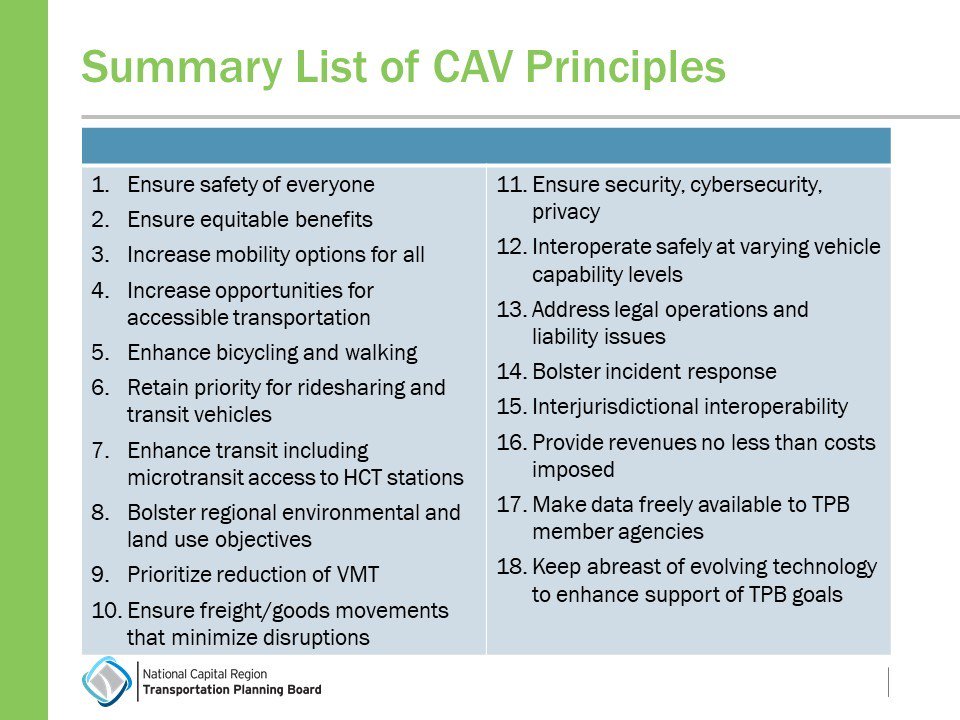The TPB kicked off its January meeting with a welcome from new TPB Chair Pamela Sebesky, approval of two resolutions related to highway safety and connected and automated vehicles (CAVs), and an opening discussion on a TPB process for considering regional surface transportation climate change goals.
Watch the presentations, download item memos, and listen to board discussion.
WELCOME FROM CHAIR PAMELA SEBESKY
Pamela Sebesky, City of Manassas Vice Mayor, is the new TPB Chair. Reuben Collins, Charles County Board of Commissioners President, is new TPB Vice Chair, and Christina Henderson, District of Columbia Councilmember-elect, is TPB Second Vice Chair.
Sebesky welcomed new TPB Technical Committee Chair Matthew Arcieri, City of Manassas Director of Planning and Development, for a committee update. Sebesky also introduced Ashley Hutson, TPB Community Advisory Committee Chair, for a report, and welcomed the newest TPB member, Takis Karantonis, Arlington County Board Member. Sebesky recognized Shyam Kannan, WMATA Managing Director, for his 10 years of service on the TPB and wished him the best as he moves on from WMATA to future endeavors.
Sebesky plans to continue the TPB’s collegial, collaborative, and deliberative discussion approach.
“We all want the transportation system to work seamlessly and reliably,” she said.
TPB offers an opportunity to share inclusive, diverse perspectives while working toward consensus and common goals.
ACTION ITEMS: HIGHWAY SAFETY AND CAV REGIONAL PRINCIPLES RESOLUTIONS
Resolutions R7-2022: 2018 – 2022 Regional Highway Safety Targets

Southwest Freeway (Ben Schumin/Flickr)
The TPB adopted 2018 - 2022 highway safety targets during the meeting. MPOs are annually required to establish highway safety targets and report progress on performance measures for number of fatalities, number of serious injuries, fatality rate per 100 million vehicle miles traveled (VMT), rate of serious injuries per 100 million VMT, and non-motorist fatalities and serious injuries.
The targets apply to all the region’s public roadways. In adopting the resolution, the TPB remains focused on achieving the region’s aspirational goals of zero fatalities and serious injuries on its roadways and uses the federally required annual regional highway safety targets to evaluate the region’s progress toward zero roadway deaths.
David Snyder, City of Falls Church Council Member, stated that TPB member jurisdictions have taken actions to improve highway safety in the region and are committed to future action to drive down an unacceptable level of fatalities and serious injuries. Bridget Newton, City of Rockville Mayor, and Kacy Kostiuck, City of Takoma Park Council Member, echoed Snyder’s comments. TPB Staff Director Kanti Srikanth, stated that the TPB has several related safety work activities: (1) making grants available so that safety improvements can be developed and implemented, (2) working with state safety engineers to determine how the TPB can work with them to improve highway safety, and (3) reviewing safety data through an equity lens to further understand the impacts and needs for safety improvements.
Resolution R8-2022: Connected and Automated Vehicles (CAV) Regional Principles
The TPB’s long-range transportation plan, Visualize 2045 (approved in 2018), included only limited information on the potential impacts of future Connected and Automated Vehicles (CAVs). The TPB planned to enhance its work activities in this topic area. TPB staff and partners have been working to enhance regional understanding of CAVs through webinars and prepared a white paper, with consultant assistance, to inform TPB work as part of its update of the 2018 Visualize 2045 plan. The TPB was presented with a draft set of CAV principles stemming from the white paper’s recommendations in November 2021. The TPB reviewed the draft, made a couple of changes to the draft to clarify the principle around prioritizing transit and ridesharing vehicles (principle # 6), added a note about features of automated vehicles to ensure safe operations of the vehicles (principle # 13), and adopted a set of CAV principles, which will be included in Visualize 2045.
The TPB adopted Resolution R8-2022, approving the following CAV Regional Principles for 'the deployment, use, or operation' of CAVs:

INFORMATION ITEMS
Unified Planning Work Program Overview
Lyn Erickson, TPB Plan Development and Coordination Program Director, provided an overview of the federal MPO requirements related to the development and implementation of the Unified Planning Work Program (UPWP), which directs the scope of work for the MPO each fiscal year (FY). The FY 2023 UPWP includes revenue estimates and planned work activities for:
- Long-Range Transportation Planning
- Transportation Improvement Program
- Planning Elements
- Public Participation
- Travel Forecasting
- Mobile Emissions Planning
- Transportation Research and Data Programs
- Regional Land Use and Transportation Planning Coordination
- Mobility and Enhancement Programs
- TBP Management and Support
- Technical Assistance Program
Board members will review UPWP revenues and expenditures in February 2022 and will be asked to approve the FY 2023 UPWP on March 16.
What’s Inside Visualize 2045: A Look at the Long-Range Transportation Plan
Stacy Cook, TBP Transportation Planner, provided an update on the development of the Visualize 2045 plan, including the outline of the plan document, the new components to be included in Visualize 2045, and the timeline for finalizing the plan document. The plan document includes nine chapters covering current conditions, factors affecting the region, public engagement, strategies for the future, funding, and performance-based planning.
Key spring/early summer dates:
- April 2022: Begin Public Comment Period on the Air Quality Conformity Analysis and the plan
- May 2022: Present public comment summary to the TPB
- June 2022: Staff recommendation for approval of the update to Visualize 2045
TPB members asked about actions that will help the region move forward with its goals. Staff reported that the plan includes projects that advance aspirational initiatives. The plan also includes specific items required by federal regulations yet addresses overarching regional priorities—such as housing and jobs access—to meet regional goals.
Kostiuk commented on the interplay between the TPB aspirational initiative, regional priorities such as equity, climate change, and the plan. Staff noted the many elements in the plan document and how these can be used in combination to assess the progress the region is making towards its aspirational goals and regional priorities each time the plan is updated. Staff pointed to chapters 1, 6, 7, and 8 which speak to member action not captured through the TPB’s long range plan, the specific list of member projects that are currently planned within fiscal constraints, results of performance analysis of the plan, and strategies to achieve the aspirational goals and reginal priorities.
Mark Phillips, WMATA representative, asked how the plan considers equity. Staff responded that equity considerations are interlaced throughout the plan and respond to comments voiced by under-represented and historically disadvantaged groups. Specific examples include but are not limited to: (1) Chapter 2: Implications of traffic emissions; (2) Chapter 3: Documented TPB equity resolutions; and (3) Chapter 6: Discussion of equity considerations for each planning area (i.e., bicycle/pedestrian, transit, roadway). Another equity consideration is the outreach conducted to traditionally underserved communities as part of the 2021 Voices of the Region Focus Groups.
Consideration of Climate Goals
The last agenda item was a discussion about the TPB’s adoption of climate goals and incorporating climate elements into the Visualize 2045 long-range transportation plan. Presenting the process for the TPB to agree on the specific climate change related elements to include in the TPB’s plan document and planning process, Sebesky noted that in spite of the sobering findings of its Climate Change Mitigation Study of 2021, the TPB agrees that it should include climate change considerations in its plan and planning process, and that the board should strive for consensus on these elements. Sebesky said that since the abilities and suitability of actions vary between members jurisdictions of this diverse body, the list of strategies included in the plan should be large and comprehensive to include actions that every member can take even if the actions chosen differ among member jurisdictions.
Sebesky and the TPB Vice Chairs shared a memorandum proposing that TPB staff develop a questionnaire for TPB member jurisdictions and agencies (to be completed by TPB members, acting on behalf of their jurisdiction/agency). The questionnaire and memorandum are based on the findings of the Climate Change Mitigation Study of 2021. The questionnaire will focus on the details of the following two elements, for eventual inclusion in the TPB long-range transportation plan. Sebesky stated that jurisdictions would receive a questionnaire, and TPB discussion on the topic will continue in future TPB meetings.
- Adopting greenhouse gas (GHG) reduction goals for the multimodal on-road transportation sector; goals that are consistent and commensurate with the region’s multi-sector GHG reduction goals.
- Endorsing a set of multi-pathway strategies that are anticipated to reduce on-road GHG emissions and commit to work towards implementing these equitably and as expeditiously as possible (keeping in mind that many of the most effective GHG reduction strategies might not traditionally be a part of regional LRTPs).
Collins spoke and noted that equity will have to be considered in all the actions that can be taken. Collins specifically noted the Charles County plans for transit along Route 301 that impacts a couple of counties, has equity implications, and would contribute to addressing climate change yet would need the state to partner with resources in order for the county to fund the costs of the transit project.
Henderson said that the District supports this action and noted that the District has been moving quickly on this topic within its own planning and that it looks for the region to go further on these actions.
Sebesky and Srikanth responded to a question from David Alcorn, Fairfax County Supervisor, that reaching consensus on the set of strategies to include would not involve any changes to the TPB’s voting process.
Montgomery County Council Vice President Evan Glass said that this is an important topic and it was likely to require some difficult conversations and considerations moving ahead. Glass said that TPB should continue to have those conversations reflecting the realities the communities and residents face in terms of climate change. Glass said he appreciated the tone the Chair has set for these conversations, one of a spirit of cooperation and coordination.
Snyder said that he supported the proposal and noted that aiming to reach consensus is a good starting point. Snyder also noted that there will be times during and specific items of this work where the region would not have consensus and thus would have to go with the majority sentiment.
Karantonis said that he agrees with the desire for consensus and understands the idea that we have something that will work for everybody. Karantonis said the addressing climate change is going to require a certain level of action urgently from all, and that it would help to know what is needed to achieve that consensus or majority support.
Kostiuk said that cooperation among all member jurisdictions at a regional level is important, especially when it comes to providing resources needed to implement some of these actions.